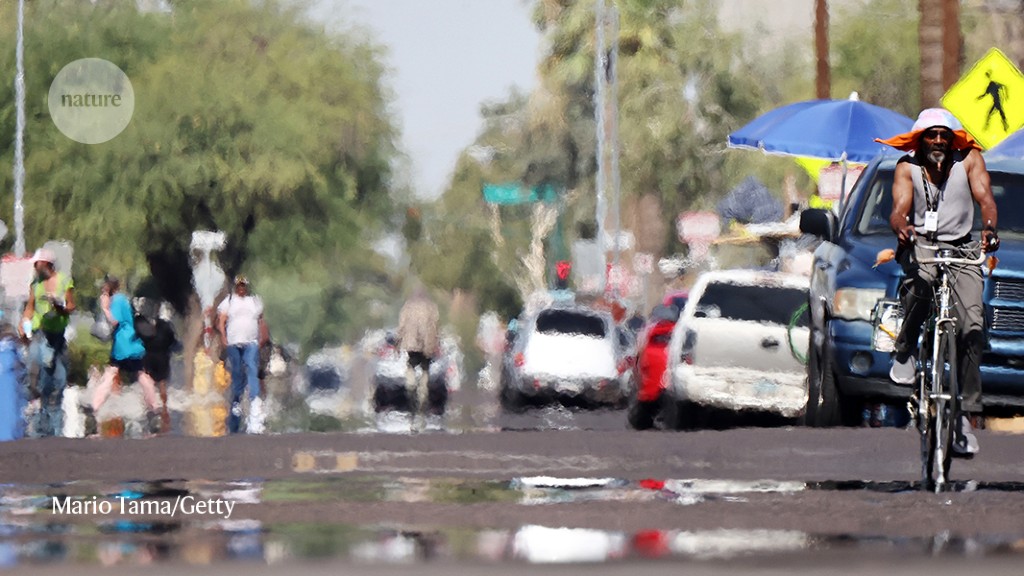Want a sustainable future? Then look to the world’s cities

In a rapidly urbanizing world, what happens in cities matters — and sustainability success stories show what can be achieved when researchers and policymakers work together

A heatwave in July took a huge toll on the largest homeless encampment in Phoenix, Arizona.Credit: Mario Tama/Getty
More than half of the world’s population lives in cities, and that proportion is set to grow. By 2050, another two billion people will be urban dwellers, the United Nations estimates. Cities lie at the nexus of all aspects of human development, from building thriving economies to coping with climate change.
The 11th of the UN Sustainable Development Goals (SDGs) aims to “make cities and human settlements inclusive, safe, resilient and sustainable” by 2030. Progress towards this goal is poor, as it is for many other SDGs, which Nature has been exploring in a series of editorials. A 2023 report by UN-Habitat, the UN agency tasked with building a sustainable urban future, demonstrates starkly that the world is set to miss most or all of the targets for SDG 11.
Cities are complex places in which numerous issues can boil to a crisis at different scales and across long periods of time. Major themes include housing, waste management and transport. Researchers can help to turn things around by connecting all these aspects, using complexity research, systems thinking and other methods to provide actionable information.
The list of challenges confronting the world’s cities is underpinned by persistent inequality — the subject of SDG 10 (see Nature 620, 468; 2023). More than one billion people live in informal settlements without regular access to piped water, sanitation and other municipal services. Hundreds of millions of people have no home at all. People living in sprawling settlements often have to travel long distances to get to their jobs; these commutes exacerbate air pollution and reduce worker productivity.
Yet fewer than two in five nations that have adopted the broad set of SDGs have explicit strategies for cities, the World Resources Institute noted in a 2021 report (see go.nature.com/3e4gec6). Even cities in the same country can face different challenges, yet relevant data are often collected only at the national level. Attempts to translate data into sustainable-development targets can also be hampered by resource limitations, privacy concerns and disagreements over data ownership (G. Jain and J. Espey npj Urban Sustain. 2, 7; 2022).
Empowered local leaders can nonetheless develop useful solutions. Bangkok, for instance, tackled the twin challenges of informal housing settlements and flooding by working with cooperatives of people living in these areas. In Uganda, Kampala reworked the relationships between its city agencies and its residents, adopting waste-management practices that prioritized low-income communities and markedly increased how much human waste the city could treat. In Indonesia, Surabaya introduced a programme in which people can use plastic bottles to pay for bus fares; the plastic is collected for recycling and the funds put towards bus operations, simultaneously cutting down on rubbish and bolstering public transport.
Despite these differing needs, much more can be done to establish holistic frameworks for studying cities. Some ideas are emerging from a small but focused international collaboration called PEAK Urban, which connects researchers at institutions in China, Colombia, India, South Africa and the United Kingdom. These researchers are among those calling for a “new urban narrative for sustainable development” that foregrounds complexity and systems science (M. Keith et al. Nature Sustain. 6, 115–117; 2023).
There is a long and rich history of studying cities as complex systems. This ranges from work by physicist Geoffrey West at the Santa Fe Institute in New Mexico showing how simple mathematical laws govern crime rates, average walking speeds and many other aspects of city life, to insights by Michael Batty and Paul Longley at University College London into the fractal nature of urban growth. Research must also incorporate aspects such as inequality and climate change, and must tailor the findings to the needs of individual cities.
That means, for example, not just running a climate model to work out what parts of Jakarta will be the hottest in the coming years, but also working out how heat will affect minibus drivers, the loss of whom, even temporarily, could shut down transport across the city. Another example comes from Colombia, where researchers working with PEAK Urban are using machine learning to analyse satellite images and predict cities’ water and sewage needs. Such an approach combines data from government, industry and people who need the services to allocate scarce resources.
Other researchers should adopt similar approaches and begin to tackle urban challenges in a broad, systems-of-systems approach. The work will be messy, fast-paced and difficult. It will require detailed collaboration with people on the ground and a well-honed sense of what is possible politically. Consider the example of David Hondula, a specialist in extreme heat at Arizona State University and director of the Office of Heat Response and Mitigation in Phoenix, a department formed in 2021. He has worked across the fragmented landscape of city services to marshal resources such as cooling centres and outreach to help people experiencing homelessness during the city’s brutal July heatwave.
A similar, wider fragmentation must be addressed so that experiences, interventions and success stories from one city can be applied more widely. Cities currently lack visibility and prominence in international and multilateral governance systems. Policy specialists and social scientists with knowledge of international governance must collaborate with urban planners and local governments to help them direct their messages to the right people in ways that feed into international political discourse. Only through such efforts can cities globally — and thus the world — be put on track to a sustainable future. As Susan Parnell at the University of Bristol, UK, puts it: “Cities are the place where this stuff is going to be won or lost.”
Nature 620, 697 (2023)
doi: https://doi.org/10.1038/d41586-023-02597-3
This story originally appeared on: Nature - Author:furtherReadingSection


















